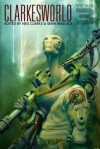

This certainly made up for "City of Illusions". I admit that the end lost me, but then again, dreams are not supposed to make sense all the way.
There is a persistent feeling of urgency about this story. Haber's conceit and grandiosity is apparent soon enough, and the more the book advances, the more anxiety how beholden to Haber Orr is it caused me. It almost tips into impatience about how passive Orr is.
And that might be part of how genius the book is. Because for all intents and purposes, Orr is a god. THE god and creator of the world inside those pages. And the story itself shows us what Orr himself puts in words: that an unbalanced god that is not part of his own world and tries to meddle with prejudice ultimately destroys everything.
There is much more. A recursiveness that gets reeeeally tangled and confusing at the end. Either a god that dreams himself and more gods into existence (a little help from my friends), or maybe that other dreamers already existed, and even, maybe, that the dreamer was not the one we thought (specially from halfway in). The way we keep coming back to the importance of human connection (the one thing Haber maybe had right, even if he denied it in his own dealings), the fact that "the end justifies the means" implies that there is and end, as if history, or mankind, or the world wouldn't then march on, and as that is not truth, then there are only means.


















